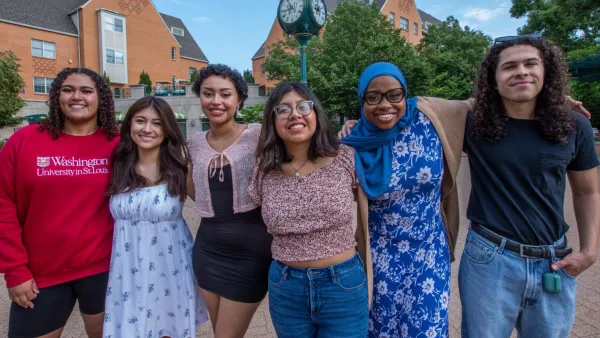As part of a sustained commitment to promote collaboration, innovation, and leadership within the academic realm, the WashU Department of Political Science hosted an innovative day-long conference this semester that brought together chairs from various political science departments across the country. Held in early March, the conference served as a platform for sharing strategies and practices that foster inclusion, equity, and a sense of belonging for faculty, staff and students within departments.
The day-long conference was packed with engaging presentations from esteemed speakers within the field. The lineup included: Chancellor Andrew D. Martin, Vice Dean and Professor Adia Harvey Wingfield (Sociology), Sarah Sled (Google UX), Vice Provost Mary McKay, Professor Adrienne Davis (Law and Olin Business), Vice Dean and Professor Sophia Hayes (Chemistry), Chair Jen Heemstra (Chemistry), Chair George-Levi Gayle (Economics), Professor Clarissa Hayward (Political Science), Professor Matthew Hayes (Political Science), and Provost Beverly Wendland. Guests from twenty-five political science departments were in attendance, providing a broad swath of experiences from coast to coast.
Betsy Sinclair, Chair of Political Science at WashU, greeted the participants in the morning with the day’s thematic question- How can we be successful in building an inclusive academic community? Sessions delved into a wide array of topics ranging from department management and metrics for success, to inclusive faculty hiring and transforming department culture. The opportunity to hear from diverse, transdisciplinary scholars offered a unique experience for department chairs to gain valuable insights into emerging trends, building diverse teams, and effective leadership strategies.
These sessions sparked lively discussions on pressing issues such as the role of political science departments in addressing contemporary societal challenges, the importance of diversity and inclusion in higher education, and the evolving nature of academic leadership in an era of rapid change. During breaks, participants actively exchanged ideas, experiences, and practical solutions to common challenges faced by departments in today's challenging academic landscape.
Moreover, the conference served as a catalyst for fostering meaningful collaborations and partnerships among political science departments. Attendees had the chance to network with peers, establish connections, and explore potential avenues for joint projects. This collaborative spirit serves to advance the leadership of political science departments nationwide.
“We know that people do their best work in environments where they feel valued, and our world needs that work -- answers from political scientists for how to navigate our tumultuous present -- more than ever,” said Sinclair, reflecting on the day’s gathering. “Bringing a community of chairs together lets us share strategies for how to create departmental culture that lets everyone thrive."




